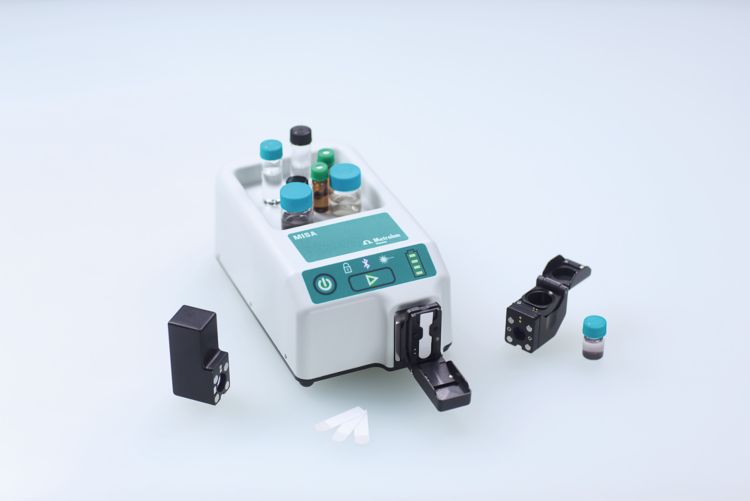Metanil yellow (MY) is an azo dye used in the manufacture of external-use products such as textiles; however, it is prohibited from use as a food additive in many countries. Toxicology studies demonstrate that ingestion of MY results in significant neurological and multi-organ damage. Despite these hazards, MY is commonly used as an illicit colorant for enhancing the visual appeal of spices and legumes, most notably turmeric. Given the rising popularity of turmeric as a dietary supplement promising significant health benefits, routine safety tests must be readily available to ensure the integrity of turmeric-containing products. Ideal tests feature methods that are selective and sensitive, yet portable and convenient.
Misa (Metrohm Instant SERS Analyzer) achieves rapid and accurate detection of MY in a facile assay format.
Misa is a versatile analytical tool for detecting banned colorants in foods. This application note details a simple, conservative extraction procedure for the detection of MY in turmeric.

To establish a reference spectrum for MY, a pure standard in 50 mmol/L HCl is analyzed using gold nanoparticles (Au NPs). The unique SERS spectrum presented in Figure 1 can be used to create a library entry for MY.

For simulated testing of MY in turmeric, solid MY was mixed thoroughly with commercially bought turmeric powder to yield a concentration range of spiked samples: 10 and 1 mg/g, 100 and 50 μg/g. MY was extracted by the addition of 1 mL 0.5 mol/L HCl to 100 mg of each sample in a glass vial. This suspension was shaken and allowed to settle for 10 minutes. Test samples were prepared by pipetting 100 μL of the HCl extract into vials containing 800 μL of Au NPs and 100 μL of 0.5 mol/L NaCl. Each vial was inverted to combine the components and then inserted into the vial attachment on Misa for analysis.
| Instrument | Acquisition | ||
|---|---|---|---|
| Firmware | 0.9.33 | Laser Power | 5 |
| Software | Misa Cal V1.0.15 | Int. Time | 10 s |
| Misa Vial Attachment | 6.07505.040 | Averages | 10 |
| ID Kit - Au NP | 6.07506.440 | Raster | ON |
Overlaid baseline-corrected spectra acquired for the spiked samples demonstrate detection of MY down to 0.1 mg/g (Figure 2). Reliable detection is based on prominent peaks at 504, 1176, 1383, and 1588 cm-1 in the spectrum.
Detection of Metanil Yellow in the field
Using the large end of the scoop, add 3–4 scoops of sample to a 2 mL vial. Add HCl solution to the vial until halfway full. Cap and shake the vial gently to mix, and let sample rest for 5 minutes. Fill a clean vial halfway full with Au NPs. Using pipettes, add 2 drops each of sample solution and NaCl solution to the Au NPs, then cap and shake the vial gently to mix. Insert into vial attachment on Misa for measurement.
| ID Kit - Au NP | 6.07506.440 |
|---|---|
| includes: | Gold nanoparticles (Au NP) |
| Scoop | |
| Disposable pipettes | |
| 2 mL glass vials | |
| Reagents | |
| HCl solution | 4 mL HCl in 100 mL water |
| NaCl solution | 3 g NaCl in 100 mL water |
| Test settings | Use ID Kit OP on MISA |
The rapid detection of MY in adulterated turmeric is demonstrated using Misa and Au NPs. This assay requires minimal user training, making it ideal for cost-effective, on-site QC testing in large food processing facilities, as well as distribution and receiving centers. Recently, the sensitive detection of MY in dal, a yellow split pea commonly used in Indian cuisine, with Metrohm Raman’s portable Sierra spectrometer suggests potential for using Misa to screen a wide variety of foods prized for their intense yellow coloration.
 Applikationen teilen
Applikationen teilen
 Download PDF
Download PDF